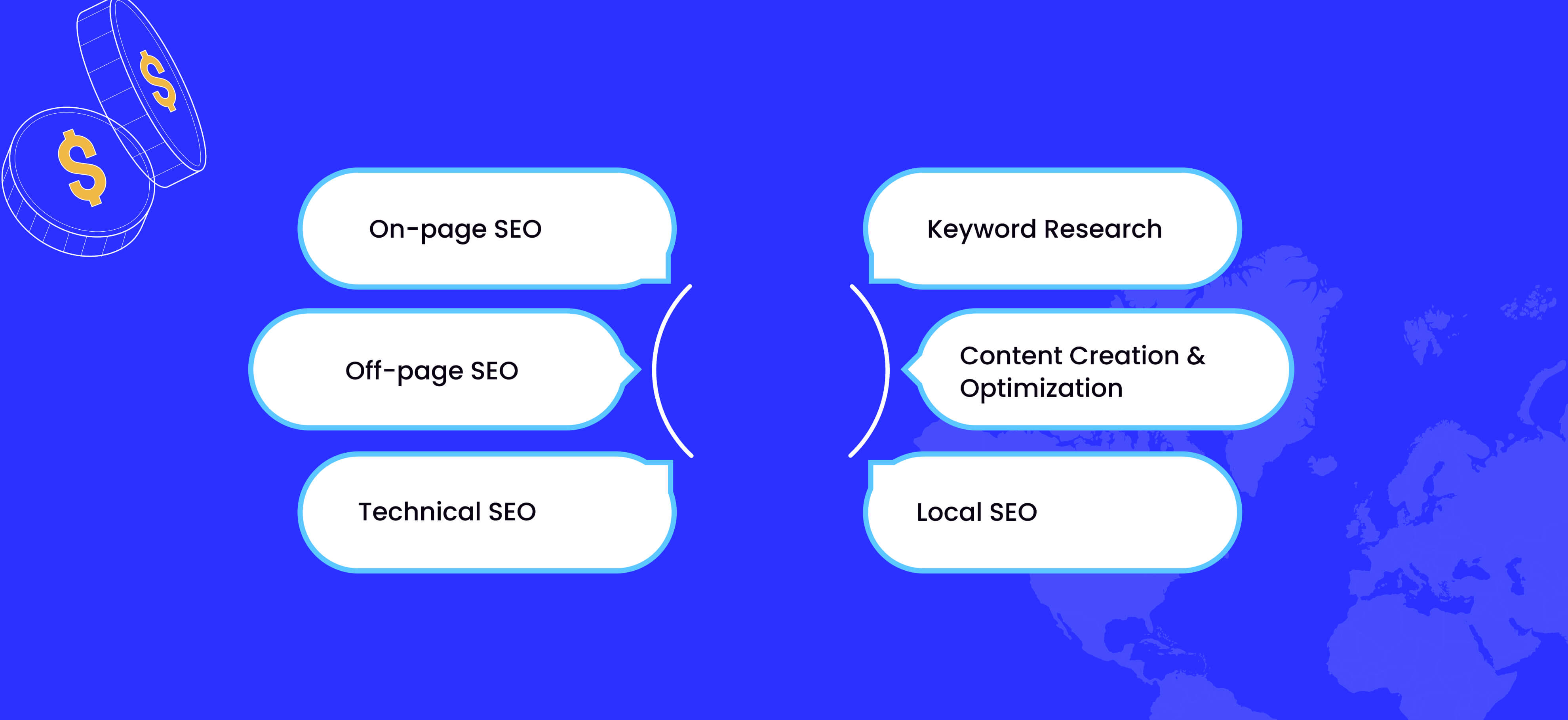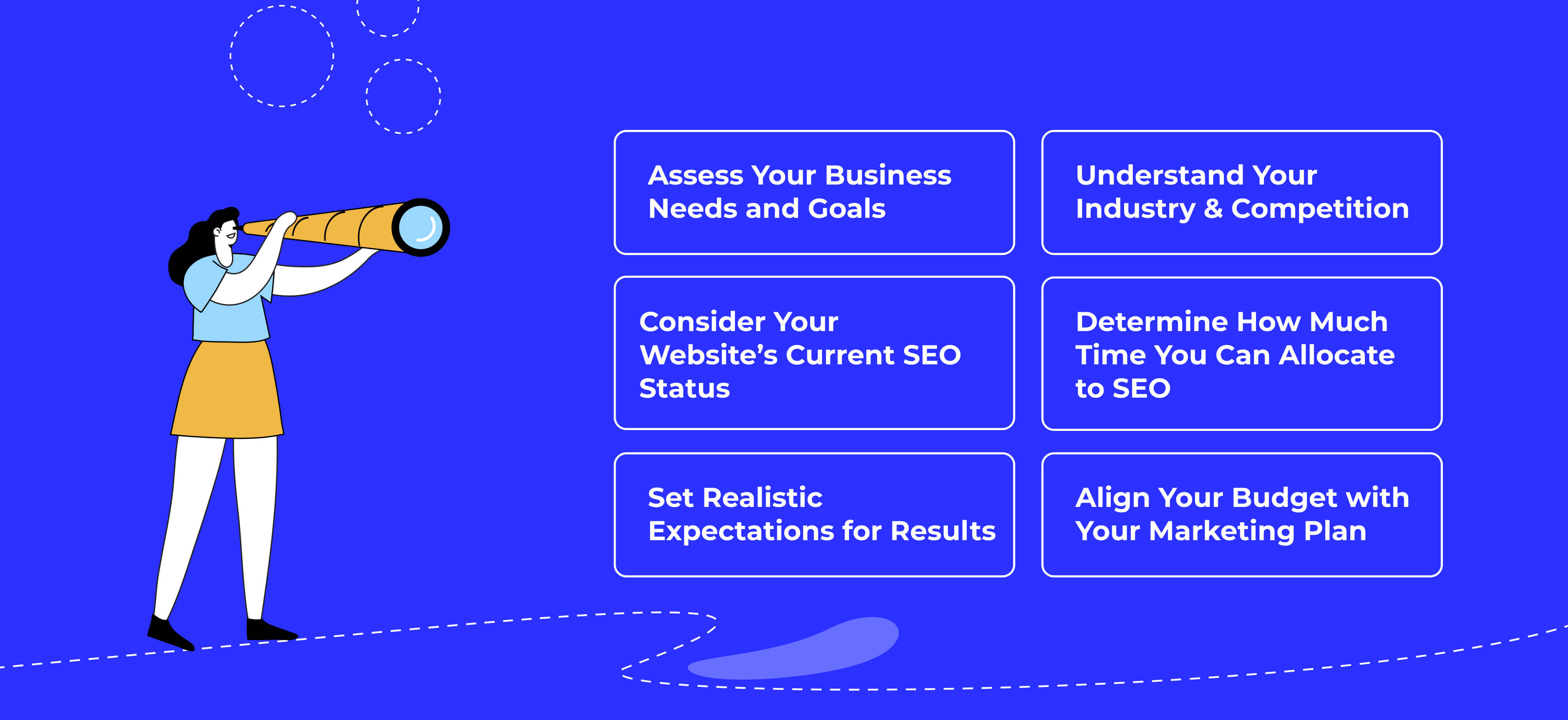A Comprehensive Guide to the Cost of SEO for Small Business

 13.5 min
13.5 min
The digital world is always changing, hence small firms may find it difficult to leave their mark in this large terrain. SEO, or search engine optimization, is among the most effective strategies for raising web presence and increasing website traffic. The issue is that SEO isn't free, thus even if the outcomes can be remarkable, small firms' SEO costs can differ greatly.
Small business owners have probably wondered: How much should I spend on SEO? Actually, no one-size-fits-all solution exists. From the range of services to the complexity of your sector, SEO rates can change depending on several elements. Knowing the nuances of SEO pricing will enable you to decide how best to allocate funds for it.
This book will lead you through the key elements of SEO costs for small businesses, thereby enabling you to make wiser decisions and prevent overspending while yet maximizing the value of your SEO activities. By the end of this post, you will have a thorough knowledge of SEO price strategies, the elements influencing the cost, and how to create a reasonable SEO budget matching with your company objectives.
Understanding SEO Costs: What’s Included?

Understanding what you really pay for when it comes to SEO will help you to better negotiate pricing. Investing in SEO for your small business is effectively paying for a suite of services meant to increase your online visibility and guarantee your website ranks highly on search engines like Google.
1. On-page SEO
This covers the enhancement of your website's elements—including meta tags, headings, content, graphics, and URLs. Good on-page SEO guarantees that search engines can quickly index your material.
2. Off-page SEO
This entails outside your website efforts such link building, social media marketing, and influencer outreach meant to increase the authority and ranking of your page. Credibility of your website is much enhanced by backlinks from reliable websites.
3. Technical SEO
This centers on maximizing the technical features of your website, including site structure, indexing, mobile friendliness, and speed. Technically sound websites are more likely to rank higher and offer better user experience.
4. Keyword Research
An efficient SEO plan depends on knowing which keywords your target market searches for. Keyword research guarantees your material fits user intent by helping you choose the correct words to target.
5. Content Creation and Optimization
Success in SEO depends mostly on excellent, interesting, and instructive content. Content production and optimization follow SEO best practices and include authoring articles, blogs, and producing media your audience will find relevant.
6. Local SEO
Local SEO is absolutely vital for small businesses. It entails maximizing your internet profile to show up on Google My Business and local searches. Businesses who depend on local consumers and want to show up in "near me" searches must thus pay great attention to this.
Every one of these components calls for time, knowledge, and attention to detail, which helps to explain the whole cost of SEO for small companies. Knowing what SEO services entail helps you to assess whether the cost is fair given the value offered.
Curious About What SEO Will Cost You?
Get a personalized SEO quote tailored to your small business needs—no guesswork, just clarity.
Get a Free Quote
Factors That Impact SEO Pricing
SEO pricing is not a one-size-fits-all situation. Several factors influence how much you'll pay for SEO services, and these factors can vary depending on your business’s needs, goals, and the market you operate in.
A. Business Size and Scope
Larger businesses with more complex websites or multiple locations may require more extensive SEO efforts, which can increase the cost. Small businesses with a local focus may have simpler SEO needs, but even they can face higher prices if they operate in a highly competitive market.
B. Industry Competition
If your business operates in a competitive industry, SEO efforts will require more work to help your website stand out. For example, industries like legal services or real estate are notoriously competitive, which means more work and higher costs.
C. SEO Agency Experience and Reputation
More experienced agencies with a proven track record tend to charge higher rates because they bring added value in terms of expertise, strategy, and results. Hiring a seasoned SEO professional could be more expensive, but it could save you time and deliver better results in the long run.
D. Scope of SEO Services
A full-service SEO strategy that includes on-page, off-page, and technical SEO, along with content creation and monitoring, will cost more than a basic package that only includes on-page SEO or local optimization. The more comprehensive the services, the higher the cost.
E. Geographic Targeting
If your business is targeting a global audience, SEO efforts will need to be more broad and varied. Local businesses may see more affordable pricing, but companies that need to optimize for international searches may need to invest more resources to compete effectively.
F. Timeline for Results
SEO is not a quick fix; it’s a long-term investment. However, if you want faster results (such as a quicker improvement in rankings or traffic), the cost may go up. Agencies that offer expedited SEO services will charge a premium for their ability to deliver quick outcomes.
These factors play a critical role in determining the final price you’ll pay for SEO for your small business. Understanding them can help you manage expectations and make an informed decision based on your unique situation.
SEO Pricing Models for Small Businesses

Now that we’ve unpacked the basics of SEO and the factors that affect its cost, let's dive into the different pricing models you might encounter when looking for SEO services for your small business. Understanding these models is crucial for evaluating what works best for your business goals and budget.
Hourly Rate
One of the most straightforward pricing models is the hourly rate. Agencies or freelancers offering SEO services may charge you for the amount of time they spend working on your SEO efforts. Hourly rates can range anywhere from $50 to $300 per hour, depending on the expertise of the professional and the complexity of the tasks.
The benefit of this model is flexibility—you're essentially paying for the work done, and you can scale up or down depending on your needs. However, one downside is that it can be challenging to estimate how many hours will be required to achieve your SEO goals, especially if you're just getting started.
Best for:
Businesses looking for ad-hoc SEO services or those with a limited budget.
Monthly Retainer
A popular model for small businesses is the monthly retainer. With this arrangement, you agree to pay a fixed monthly fee for a set package of services. This model is often ideal because it provides predictable costs and a long-term partnership, allowing the SEO expert to continuously work on improving your rankings over time.
The cost of a monthly retainer varies significantly based on the level of service provided—anywhere from $500 to $5,000 per month or more. The fee typically covers ongoing services like content creation, link building, technical SEO, and performance tracking. Some agencies also offer tiered retainer packages to suit different business needs.
Best for:
Businesses seeking long-term SEO growth with consistent results and a steady budget.
Project-Based Pricing
If your small business is only looking for a one-time SEO project (e.g., a website overhaul, an SEO audit, or a targeted content creation campaign), project-based pricing might be the best option. This model charges a flat fee for the project scope, which allows you to have a clear understanding of what you’re paying for.
The cost will vary depending on the size and complexity of the project but typically ranges from $1,000 to $30,000. While this model might seem appealing for businesses that need immediate SEO help, it’s important to remember that SEO is an ongoing process. A one-off project may help improve your site’s performance, but it won’t deliver sustainable results without continued efforts.
Best for:
Businesses looking to address specific SEO challenges or short-term goals.
Performance-Based Pricing
Performance-based pricing is a more unconventional model but one that some agencies use. With this model, the SEO agency’s fees are tied directly to the results they deliver. This could be measured by increases in organic traffic, ranking improvements, or leads generated. In this model, you only pay when the results meet certain agreed-upon milestones.
The main benefit is that you only pay for success, but be cautious—this model may lead to potential conflicts over what counts as a measurable result. It's also important to note that SEO is a long-term game, so if an agency promises quick results in exchange for payment based on performance, that could be a red flag.
Best for:
Small businesses who want to see direct results and are willing to wait for SEO efforts to bear fruit.
Commission-Based Pricing
Less common but still an option, commission-based pricing works similarly to performance-based pricing, where the SEO agency earns a commission based on specific results. This could include a percentage of revenue generated from SEO efforts or a percentage of leads converted from organic search traffic.
This model can be beneficial for businesses with a high lifetime value of customers or sales-driven goals. However, because the model ties compensation to revenue or leads, it may require a more hands-on relationship and deeper alignment of goals between the business and the SEO agency.
Best for:
Businesses with clear revenue-generation goals from SEO efforts.
Ready to See What SEO Can Do for Your Budget?
Discover the cost-effective SEO solutions designed for small businesses like yours.
Learn More!
How to Set a Realistic SEO Budget for Your Business

By now, you’ve probably noticed that the cost of SEO for small businesses can vary significantly. Setting a realistic SEO budget for your business will depend on your specific goals, industry, competition, and available resources. Here are a few steps to help you calculate an SEO budget that works for you:
I. Assess Your Business Needs and Goals
Before deciding on an SEO budget, think about what you want to achieve. Do you need to drive more traffic to your website? Are you looking for more local customers, or do you want to expand globally? Are you launching a new product or website that requires a boost in visibility? The answers to these questions will determine the scope of SEO work needed.
If your goal is to increase local visibility in a low-competition market, you might not need to invest as heavily as a business looking to compete in a saturated industry with national or international competition. Be clear about your business goals so you can align them with your budget.
II. Understand Your Industry and Competition
Your industry will play a big role in determining your SEO budget. Highly competitive industries, such as law, real estate, or finance, often require more investment because SEO strategies are more complex and require continuous effort to stay ahead of competitors.
Do some research on your competition. What SEO tactics are they using? What are they ranking for, and how are they engaging with their audience? This will help you determine how much SEO investment is necessary to compete effectively.
III. Consider Your Website’s Current SEO Status
If your website is in poor shape and has technical issues that need to be addressed, the initial cost of SEO might be higher. You may need to invest in fixing broken links, improving page load speed, optimizing your content, and other technical elements to create a solid foundation.
On the other hand, if your website is already well-optimized and ranks well for some keywords, you may not need as much investment in the beginning. This is why conducting an SEO audit is an essential step before setting your budget.
IV. Determine How Much Time You Can Allocate to SEO
SEO is not a one-and-done job—it requires ongoing effort. Some businesses can handle part of the SEO work themselves, such as creating content or managing their social media accounts, while others may need a full-service SEO agency to handle everything. Factor in the time you can realistically commit to SEO efforts when deciding your budget.
V. Set Realistic Expectations for Results
SEO is a long-term investment. Unlike paid ads that can deliver immediate traffic, SEO efforts take time to show results—usually 3 to 6 months, or even longer. Make sure your expectations are aligned with the reality of SEO timelines. Setting a budget that allows for sustained efforts over time is key to seeing the results you want.
VI. Align Your Budget with Your Marketing Plan
Your SEO budget should align with your overall marketing strategy. If SEO is a major component of your plan to grow your business, it may deserve a larger share of your budget. However, if SEO is just one piece of a larger digital marketing puzzle, consider how it fits in with other efforts, like social media marketing or paid advertising.
Once you’ve gone through these steps, you’ll have a clearer idea of what’s reasonable for your small business. Setting a budget that’s too low could limit your results, but setting it too high could strain your finances. Aim for a balance that allows for continuous improvements while remaining within your business’s financial capacity.
By now, you should have a solid understanding of SEO pricing models and how to set a budget that works for your small business. Remember, SEO is a marathon, not a sprint—so be prepared for the long haul. In the next section, we’ll wrap up with some key takeaways to help you confidently navigate the world of SEO costs and set your business on the path to digital success.
How Much Should You Actually Spend on SEO?
Let us evaluate your goals and give you a realistic pricing breakdown.
Get a Free Assessment
Conclusion
As a small business owner, diving into the world of SEO can feel like a big leap, but it’s one that pays off in the long run. Understanding the cost of SEO for small businesses is essential to make sure you're not caught off guard by unexpected expenses or frustrated by unrealistic expectations. By knowing what’s included in SEO services, the factors that impact pricing, and the different pricing models available, you can confidently budget for SEO in a way that aligns with your goals and financial capacity.
Setting a realistic SEO budget is about understanding your business needs, competition, and current SEO status. Whether you choose a monthly retainer, a project-based model, or another pricing structure, the key is to invest in a strategy that makes sense for you and your growth trajectory. SEO isn’t a one-off task—it’s an ongoing effort that requires time, dedication, and expertise.
If you're uncertain about where to start, partnering with a reliable, experienced team—such as an organic SEO agency—can help guide your business through the complexities of search engine optimization. Ultimately, the goal is to create a strong online presence that delivers sustained growth, not just a quick fix. So, invest in SEO wisely, stay patient, and watch your small business thrive in the digital age.
FAQs
The cost of SEO for small businesses varies based on factors like your industry, the scope of services, and the level of competition. Typically, small businesses can expect to pay anywhere from $500 to $5,000 per month for ongoing SEO services, depending on their needs and goals.
SEO is a long-term investment, and it usually takes 3 to 6 months to see significant results, depending on the competition and current SEO status of your website. Patience is key, as SEO improvements build over time with consistent efforts and strategy.
Yes, SEO is one of the most cost-effective marketing strategies for small businesses. It provides long-term results, enhances visibility, and attracts organic traffic, ultimately leading to more conversions and higher ROI when executed properly.
Hiring an SEO agency can be beneficial for small businesses that lack the time or expertise to manage SEO effectively. A reputable agency brings specialized knowledge and experience, ensuring a focused and efficient approach to SEO strategies that deliver better results.
Several factors influence the cost of SEO, including your business's size, competition in your industry, the complexity of your website, and the services you need (on-page, off-page, technical SEO). A more competitive market or a website with technical issues may increase your SEO costs.
Yes, even with a limited budget, small businesses can achieve SEO success by focusing on high-impact strategies like local SEO, keyword optimization, and content creation. Prioritizing the right areas and working with experts can help you get the best return on your investment.




